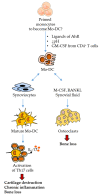Shaping of Monocyte-Derived Dendritic Cell Development and Function by Environmental Factors in Rheumatoid Arthritis
- PMID: 34948462
- PMCID: PMC8708154
- DOI: 10.3390/ijms222413670
Shaping of Monocyte-Derived Dendritic Cell Development and Function by Environmental Factors in Rheumatoid Arthritis
Abstract
Dendritic cells (DC) are heterogeneous cell populations essential for both inducing immunity and maintaining immune tolerance. Chronic inflammatory contexts, such as found in rheumatoid arthritis (RA), severely affect the distribution and the function of DC, contributing to defective tolerance and fueling inflammation. In RA, the synovial fluid of patients is enriched by a subset of DC that derive from monocytes (Mo-DC), which promote deleterious Th17 responses. The characterization of environmental factors in the joint that impact on the development and the fate of human Mo-DC is therefore of great importance in RA. When monocytes leave the blood and infiltrate inflamed synovial tissues, the process of differentiation into Mo-DC can be influenced by interactions with soluble factors such as cytokines, local acidosis and dysregulated synoviocytes. Other molecular factors, such as the citrullination process, can also enhance osteoclast differentiation from Mo-DC, favoring bone damages in RA. Conversely, biotherapies used to control inflammation in RA, modulate also the process of monocyte differentiation into DC. The identification of the environmental mediators that control the differentiation of Mo-DC, as well as the underlying molecular signaling pathways, could constitute a major breakthrough for the development of new therapies in RA.
Keywords: ACPA; abatacept; aryl hydrocarbon receptor; biotherapies; human dendritic cells; infliximab; rheumatoid arthritis; tocilizumab; tofacitinib.
Conflict of interest statement
The author declares no conflict of interest.
Figures

Similar articles
-
Monocyte-Derived Dendritic Cell Differentiation in Inflammatory Arthritis Is Regulated by the JAK/STAT Axis via NADPH Oxidase Regulation.Front Immunol. 2020 Jul 7;11:1406. doi: 10.3389/fimmu.2020.01406. eCollection 2020. Front Immunol. 2020. PMID: 32733468 Free PMC article.
-
CD209/CD14+ Dendritic Cells Characterization in Rheumatoid and Psoriatic Arthritis Patients: Activation, Synovial Infiltration, and Therapeutic Targeting.Front Immunol. 2022 Jan 12;12:722349. doi: 10.3389/fimmu.2021.722349. eCollection 2021. Front Immunol. 2022. PMID: 35095831 Free PMC article.
-
Extensive Phenotype of Human Inflammatory Monocyte-Derived Dendritic Cells.Cells. 2021 Jul 2;10(7):1663. doi: 10.3390/cells10071663. Cells. 2021. PMID: 34359833 Free PMC article.
-
Monocytes in rheumatoid arthritis: Circulating precursors of macrophages and osteoclasts and, their heterogeneity and plasticity role in RA pathogenesis.Int Immunopharmacol. 2018 Dec;65:348-359. doi: 10.1016/j.intimp.2018.10.016. Epub 2018 Oct 23. Int Immunopharmacol. 2018. PMID: 30366278 Review.
-
The function of myeloid dendritic cells in rheumatoid arthritis.Rheumatol Int. 2017 Jul;37(7):1043-1051. doi: 10.1007/s00296-017-3671-z. Epub 2017 Feb 24. Rheumatol Int. 2017. PMID: 28236220 Review.
Cited by
-
Role of miRNAs in Rheumatoid Arthritis Therapy.Cells. 2023 Jun 30;12(13):1749. doi: 10.3390/cells12131749. Cells. 2023. PMID: 37443783 Free PMC article. Review.
-
Lipid metabolism and rheumatoid arthritis.Front Immunol. 2023 May 31;14:1190607. doi: 10.3389/fimmu.2023.1190607. eCollection 2023. Front Immunol. 2023. PMID: 37325667 Free PMC article. Review.
-
The Notch signaling-regulated angiogenesis in rheumatoid arthritis: pathogenic mechanisms and therapeutic potentials.Front Immunol. 2023 Oct 26;14:1272133. doi: 10.3389/fimmu.2023.1272133. eCollection 2023. Front Immunol. 2023. PMID: 38022508 Free PMC article. Review.
-
Tolerogenic dendritic cells in radiation-induced lung injury.Front Immunol. 2024 Jan 8;14:1323676. doi: 10.3389/fimmu.2023.1323676. eCollection 2023. Front Immunol. 2024. PMID: 38259434 Free PMC article. Review.
-
Impact of the host response and osteoblast lineage cells on periodontal disease.Front Immunol. 2022 Oct 11;13:998244. doi: 10.3389/fimmu.2022.998244. eCollection 2022. Front Immunol. 2022. PMID: 36304447 Free PMC article. Review.
References
-
- Identification of a Novel Cell Type in Peripheral Lymphoid Organs of Mice. I. Morphology, Quantitation, Tissue Distribution-PubMed. [(accessed on 30 November 2021)]; Available online: https://pubmed.ncbi.nlm.nih.gov/4573839/
Publication types
MeSH terms
Substances
LinkOut - more resources
Full Text Sources
Medical

